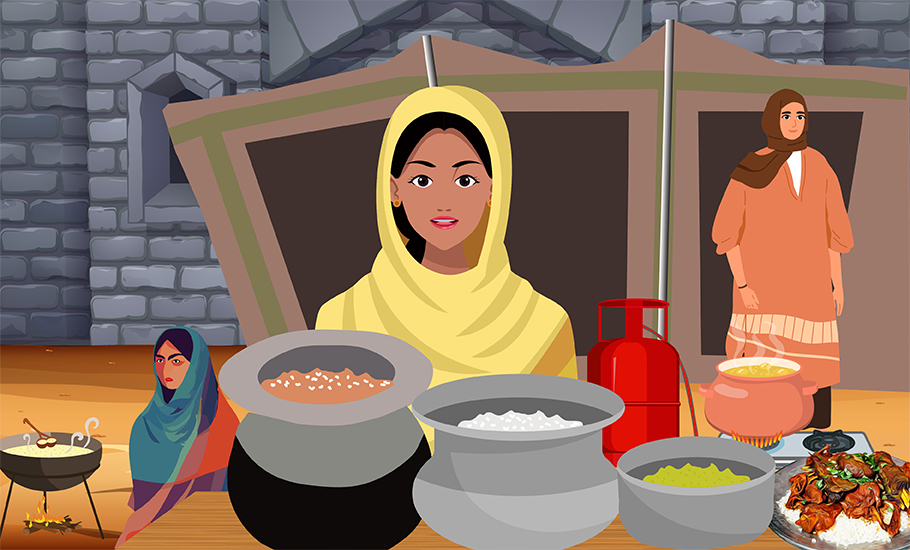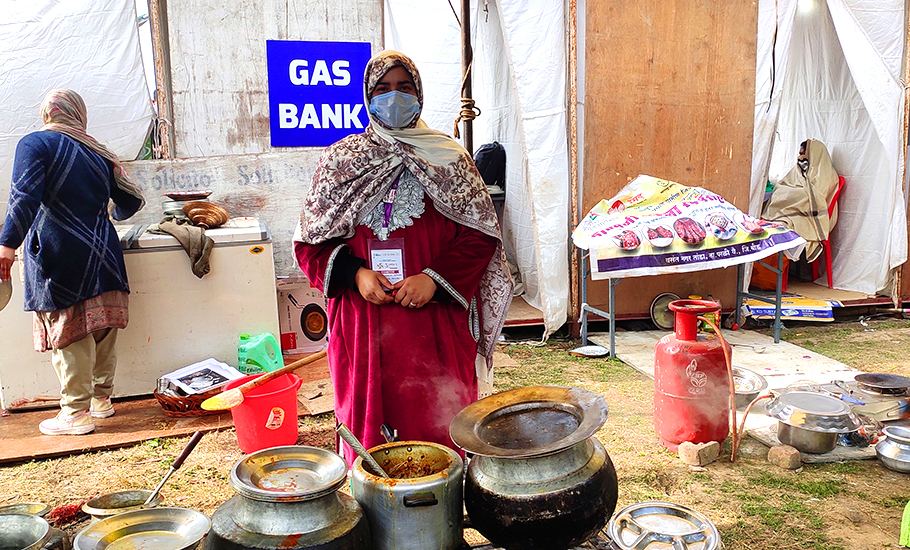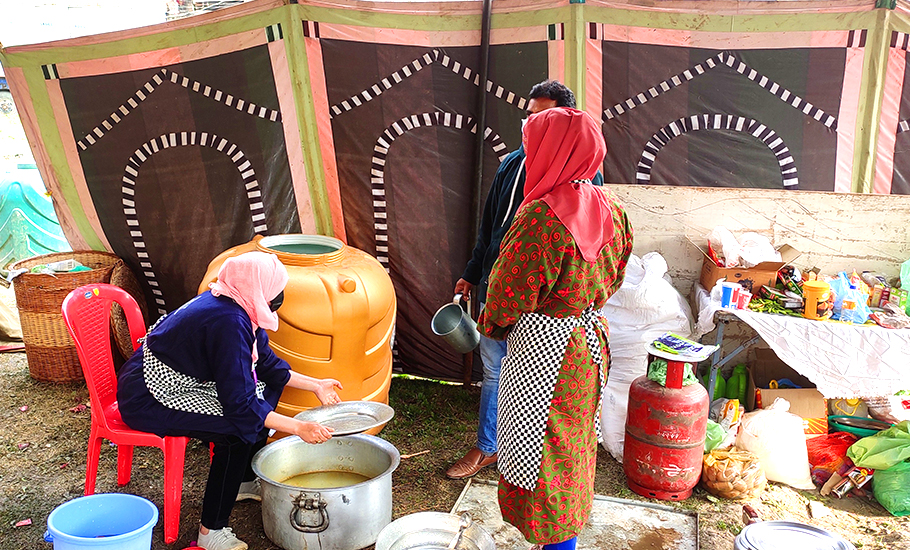
- Home
- News
- Analysis
- States
- Perspective
- Videos
- Education
- Entertainment
- Elections
- World Cup 2023
- Features
- Health
- Business
- Series
- Economy Series
- Earth Day
- Kashmir’s Frozen Turbulence
- India@75
- The legend of Ramjanmabhoomi
- Liberalisation@30
- How to tame a dragon
- Celebrating biodiversity
- Farm Matters
- 50 days of solitude
- Bringing Migrants Home
- Budget 2020
- Jharkhand Votes
- The Federal Investigates
- The Federal Impact
- Vanishing Sand
- Gandhi @ 150
- Andhra Today
- Field report
- Operation Gulmarg
- Pandemic @1 Mn in India
- The Federal Year-End
- The Zero Year
- Premium
- Science
- Brand studio
- Home
- NewsNews
- Analysis
- StatesStates
- PerspectivePerspective
- VideosVideos
- Entertainment
- ElectionsElections
- Sports
- Loading...
Sports - Features
- BusinessBusiness
- Premium
- Loading...
Premium

Why a 36-course wazwaan cooked by Kashmir’s first woman ‘master chef’ is too hot to handle for men

At just 24 years of age, Humaira Dilawar has broken a tradition that’s been fiercely guarded for over six centuries by a clan of men sharing a common profession that’s been passed down through generations. Self-effacing and humble to a fault; insisting repeatedly that she is still learning her craft and needs all the encouragement she can get, Dilawar, even though she doesn’t lay claim...
At just 24 years of age, Humaira Dilawar has broken a tradition that’s been fiercely guarded for over six centuries by a clan of men sharing a common profession that’s been passed down through generations. Self-effacing and humble to a fault; insisting repeatedly that she is still learning her craft and needs all the encouragement she can get, Dilawar, even though she doesn’t lay claim to the title herself, is the only woman ‘waza’ – or more accurately, the only woman wasta waza – in Kashmir.
For the uninitiated, waza is the title ascribed to cooks in Kashmir who prepare the lavish 36-course wazwaan – an extravagant feast that is reserved only for special occasions such as a wedding or the devgon/divagon (a pre-wedding ceremony among Kashmiri Hindus). The wasta waza is the master chef under whose instructions a team of wazas (usually numbering five to 10) prepare the feast.
By most accounts, the origin of the wazwaan dates back to Timur’s invasion of northern Indian territories in late 1398 AD. In their jointly authored cookbook, Traditional Kashmiri Cuisine: Wazwaan (Roli Books, 2019), Khan Mohammed Sharief, Khan Mohammed Shafi, Khan Mohammed Rafiq – owners of the renowned Delhi-based Kashmiri cuisine catering company Ahad Sons – and Rocky Mohan, say the local belief in Kashmir is that in Timur’s wake “came 1,700 skilled woodcarvers, weavers, calligraphers, architects and cooks from Samarkand, who settled in the valley of Kashmir. The descendants of these cooks, the wazas, are the master chefs of Kashmir”.
According to noted food critic Marryam H Reshi, the wazas are a “traditional, hereditary community of male cooks who never ever cook inside their own homes, but set up an outdoor kitchen in the courtyards of their customers and cook on wood fires”.
Dilawar’s foray into this hitherto male-dominated ‘hereditary’ industry is, thus, no ordinary feat. More importantly, not only has she broken that glass ceiling herself despite sneering comments even from within her own social circle, Dilawar has also put together an all-woman group of five others who now work under her as wazas. That, unlike all her male counterparts, she is a first-generation waza also makes Dilawar’s achievement even more significant.
Her journey, of course, hasn’t been easy. The first signs of resistance came from her parents when she informed them some years ago that she was dropping out of her undergraduate course to train as a waza. “They (her parents) weren’t immediately supportive… it took a lot of convincing but gradually they understood that I wanted to be self-reliant and cooking professionally is how I wanted to achieve this,” Dilawar told The Federal, in between serving her customers at the Saras Aajeevika Mela that was hosted by Jammu and Kashmir Rural Livelihood Mission (JKRLM) in Srinagar earlier this month.
Once her venture began gaining public attention and orders for preparing wazwaans started trickling in, Dilawar’s parents shed the inhibitions about the career that their daughter had chosen. However, winning the approval of her extended family, friends and social circle in her native village of Waliwar Lar in central Kashmir’s Ganderbal district remains a work in progress.

“There has been a lot of criticism from people who know me… Many people have told me that this (being a waza) is not a woman’s job and I should rather sit at home than pursue cooking wazwaan professionally… I have also faced trolling on social media but these don’t bother me anymore. I am determined; I want to break this stereotype that only men can be wazas,” said Dilawar.
In a country where maa ke haath ka khana seems to be a universal response for anyone asked about their most cherished culinary memory, “it’s not a woman’s job” may sound like a ludicrously paradoxical advice to a young lady in her early 20s who wants to learn cooking. However, Dilawar says she doesn’t let such unsolicited advice affect her. “If you expect women to cook meals at home while also running all other affairs of the house, why can’t you accept a woman cooking professionally? Why should a woman be bound only to the kitchen of her home? Why can’t she cook wazwaan and make a living out of it,” she asks.
The inherent patriarchy within Kashmir’s waza community is often sought to be justified on grounds that preparing wazwaan is extremely labour-intensive as everything about preparing the meal – from slaughtering of the lambs to cutting and pounding of the meat to selection of spices and preparing the wood fires – has to be supervised or executed directly by the wazas. There’s also the argument that recipes for each dish that is part of the extravagant spread are unique to each of the traditional waza families of Kashmir, most notably those in downtown Srinagar’s Wazapora, passed down through generations to male inheritors of the legacy.
Though originally, a wazwaan comprised seven to 10 main dishes, over time its menu has expanded to include 36 dishes. Any wazwaan that now has fewer than 30 – if not all 36 dishes – is often a subject of ridicule; seen either as a mark of poor hospitality by the host or of the host’s inability or unwillingness to spend money even for special occasions that warrant this feast.
The expanse of a wazwaan – and by extension the money, time and effort needed to pull it off – can be gauged from the following description of this feast outlined in Traditional Kashmiri Cuisine: Wazwaan. “Hours of cooking and days of planning go into the preparation and serving of a wazwaan… the animals are slaughtered ceremonially and expertly according to Muslim custom, and the waza personally supervises the preparation of each dish that emerged from his kitchen – every ingredient for the meal is handpicked, and much toil and effort ensures that each dish is a culinary masterpiece. The wazas’ recipes are secret, locked away in their heads, passed on from generation to generation. The ultimate formal grand banquet in Kashmir is the royal wazwaan. Of its 36 courses, between 15 and 30 are meat preparations, cooked all night by the wasta waza and their retinue of wazas. Seven dishes must be a part of the meal on these occasions – tabakh maaz, rista, rogan josh, dhaniwal korma, aab gosh, marchwagan korma and gushtaba.”
The elaborate preparation a wazwaan allows the self-crowned male custodians of this centuries-old legacy to assert exclusive proprietary rights over the trade. Mohd Yousuf Kakroo, 56, who has been a waza for over three decades, says it is the people of Kashmir in general who “believe that it (preparing a wazwaan) can’t be a woman’s job”. Kakroo told The Federal, “Preparation of wazwaan is a very hectic and labour-intensive job… it requires the waza to know how the lamb has to be slaughtered, its meat cut or minced by hand, how to prepare the spices, cook all the dishes and maintain the same standard of taste each time… Women who want to take up this work need to be trained properly so that they understand the requirements of the guests while taking orders for a wazwaan.”

Given that the tradition of preparing wazwaan has largely been preserved as a hereditary one and, as such, there are well-identified families of wazas, each with a fixed clientele developed over decades, the task for a newcomer to break into this closely-guarded trade becomes all the more difficult. As per Marryam Reshi, “Every family in Kashmir, especially in the towns, has their family waza. Conversely, every waza has up to 50 families as customers. The wazwaan is the single-largest expense for a wedding. Not only that, it is the waza who determines the exact date of a wedding: if he is busy with the wedding of one of his other customers, the other wedding will have to be postponed.”
Dilawar, however, dismisses these challenges as “no big deal”. She told The Federal that although she started as a rank outsider to the profession who had the additional limitation of being a woman in a male-dominated line of work, she has now begun to develop a dedicated client base. Her focus now is to also expand her team and encourage more women to join “in keeping this Kashmiri tradition alive and taking it forward”.
Dilawar also sees her venture as one that can create job opportunities for other women while simultaneously, as a bonus, breaking the taboo around women wazas. “I am meeting more girls and involving them in this work. I tell them wazwaan is a tradition of all Kashmiris and that it isn’t an exclusive right of the men,” she said.
Srinagar-based food critic Mohd Yaseen Reshi blamed the absence of women wazas on a “conservative mindset” that has precipitated the perception that “women must be confined to their homes while the men can go out and choose to do whatever job they want”. However, even as he endorsed Dilawar’s foray into this uncharted territory for women, a hint of patronizing condescension was all too evident.
“Historically, wazwaan has been cooked by men and those chefs have only passed on their craft to other men; this is why women have not been made to learn this art of cooking… It is really encouraging to see women like Humaira entering in this line but she needs to maintain taste, hygiene, quality, the authentic way of cooking without use of artificial food colours and, most importantly, she must focus on reviving this tradition without gimmicks,” Yaseen said.
It is not surprising that such advice is rarely, if ever, offered to male wazas. Perhaps this, in itself, is an acknowledgment of the impact Humaira Dilawar, all of 24, has already made on Kashmir’s culinary landscape.

